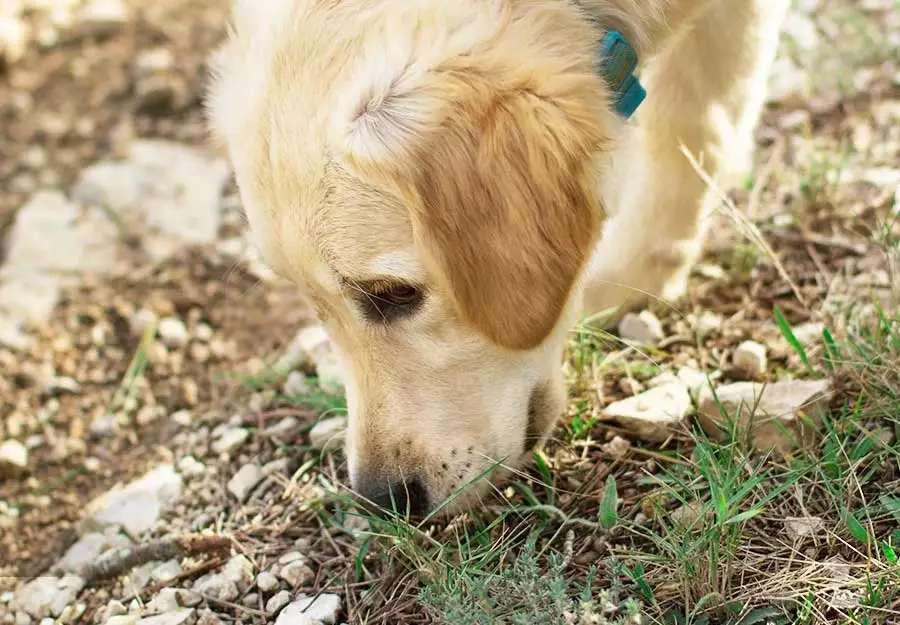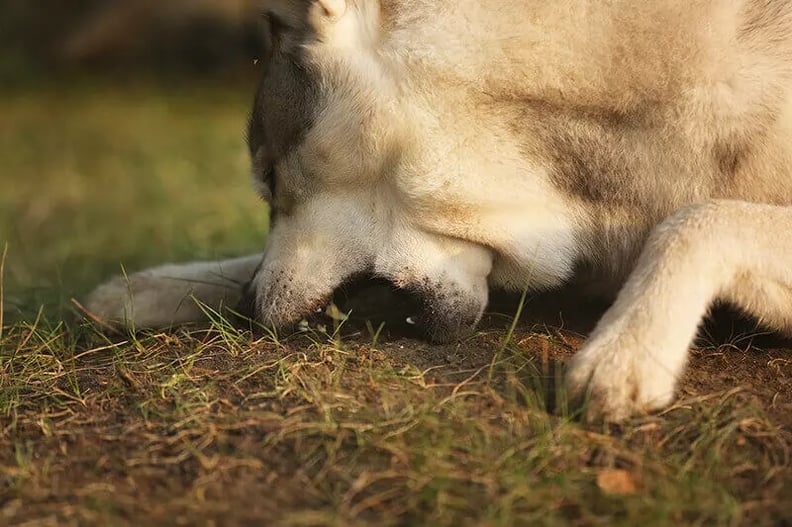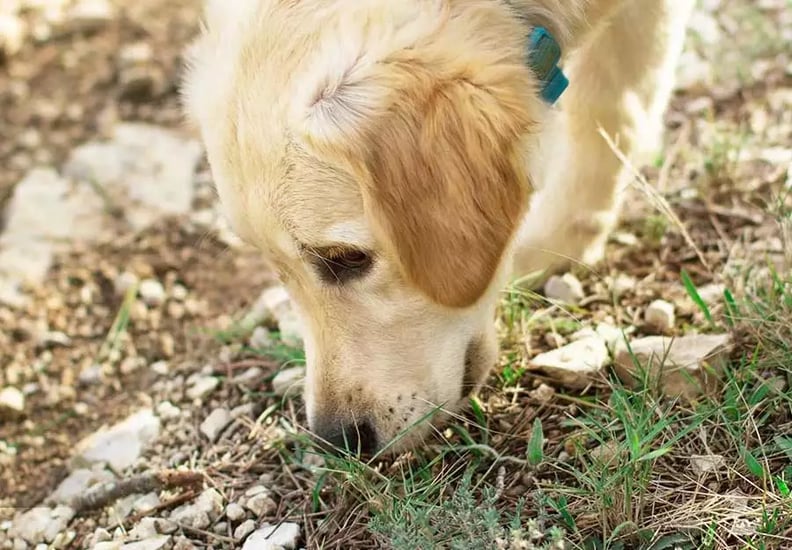
Dirt is probably not the grossest thing you’ve seen your dog eat, but that doesn’t mean that they should be chowing down on soil every chance they get. Why do dogs eat dirt, and just how harmful is it?
Dogs explore with their mouths and follow their nose, so it’s no surprise that some dogs live by the unspoken rule of, if it fits in my mouth, I eat it.
You can pick up their poop, keep dirty socks out of reach, and even close the bathroom door to keep them out of the garbage, but dirt is a little harder to avoid. It’s in the backyard, at the park; almost everywhere you take your dog, there is a smorgasbord of dirt.
A little nibble of dirt here and there is unlikely to be an issue, but if your dog is frequently eating dirt, you need to take action.
Why Do Dogs Eat Dirt?

It can’t taste good, right? So why is your dog eating dirt? Here are some of the most common causes of your dog’s disgusting mud mouth.
Boredom
There are lots of different reasons that dogs eat dirt, but the most common cause is boredom.
Dogs are known to do some odd things when they get bored. Sometimes they get anxious, sometimes they get destructive, and sometimes they just go find something else to keep them occupied. Why does my puppy eat dirt?
Dirt eating could be caused by any of these behaviours, so it's best to find the root cause of the behavioural problems to put a stop to this yucky eating habit.
Nutritional Deficiencies
While boredom is the most likely cause, it’s possible that your dog is trying to compensate for a nutritional deficiency.
This is common in dogs who are picky eaters, those that eat a lot of table scraps (creating unbalanced nutrition), and puppies and seniors that have poor digestive health.
It may not be the first thing you think of when you are looking for nutrients, but dirt can contain trace minerals. It’s simply a natural instinct, something your dog inherited from his wild ancestors.
Assess his current diet to determine if your dog is eating an unbalanced diet due to poor eating habits or digestion.
Upset Stomach
You may have heard of dogs eating grass to soothe an upset tummy, but you may not know that dirt can be soothing too. If your dog is frequently eating dirt after meals, then you may want to consider trying a new diet or implementing a digestive aid.
It’s Fun
Sometimes the simplest reason is the right one. Could be puppy eating dirt just because he wants to. Eating dirt might be something your dog has associated with playtime and exploration.
This is especially common in puppies who are experiencing everything for the first time. Tasting their environment is an important and exciting way of exploring it.
It's best not to encourage this habit by replacing it with a healthier one. When he nibbles on dirt, pull out a toy and play a game, instead.
Is Eating Dirt Dangerous?
It’s more than nasty, dirt-eating can be dangerous. Dirt can be peppered with sticks, rocks, garbage, and other debris that shouldn’t be ingested. They can be a choking hazard, or worse cause an obstruction somewhere in the digestive tract.
Rocks and sticks can cause tooth damage, too.
In addition, the soil can be contaminated with pesticides, fertilizers, or other chemicals that are toxic to your dog.
Parasites and bugs may also be hiding in the dirt. If your dog has a habit of eating dirt, then it’s a good idea to have him regularly dewormed.
7 Tips for Stopping Your Dog from Eating Dirt

There may have been a reason when they started eating dirt, but it could just be a bad habit now. Regardless of the reason for your dog's dirt-eating, the best thing to do is to break the habit. Here are 7 tips for stopping your dog’s dirt-eating.
1. Remove Access
Remove access to the soil in your yard, and stick to paved paths on your walk. This isn’t always possible, but do your best to discourage this behavior.
2. Garden Gate
If your dog is getting enough into your garden for his dirt fix, then consider putting up a barrier or fence to keep him out. Lots of common garden plants are toxic, so keeping him out of the garden is a must.
3. Stay Active
Keep your dog physically and mentally active. A consistent exercise, play, and training routine will prevent boredom and the bad habits, like dirt-eating, that come along with it. Look for activities like puzzles, agility sports, or chew toys that will keep your dog occupied.
4. Redirect
If you catch your dog going for it, then quickly offer a different activity. Call him to you and start a game of fetch, or ask for some simple tricks. Take his attention away from the dirt and direct it to a fun activity.
5. No More Table Scraps
If you are concerned that your dog is looking for nutrition in the soil, consider cutting back on table scraps or food toppers. Remember that extras, even healthy ones, should only take up 10% or less of their diet. The rest should be a complete and balanced diet.
6. Hydration
Encourage more water intake. Dehydrated pets often have poorer digestion and nutrient absorption. If your dog sticks to wet dirt and muddy puddles then it’s a good sign that your dog needs a more moisture-rich diet. Add some wet foods, or offer raw edible bones like chicken or turkey necks.
Fresh clean water should always be available for your pet. Try to remember your dog's water bottle so that he can stay hydrated when you are out and about together.
7. Supplements
Offer a multivitamin or digestive aid to your pet. This may help to reduce your dog's urge to hunt for nutrients and will improve digestion.
Building Better Habits
You may need to try multiple tactics to help your dog ditch his dirt-eating addiction, so be patient and don’t be discouraged if you don’t see immediate results.
Remember, the best way to break a bad habit is to help build a better one. A consistent exercise routine, frequent playtime, and healthy eating habits are the most effective ways to reduce unwanted behaviours like eating dirt (or other grosser things).
Frequently Asked Questions
Why do dogs eat dirt?
Dogs may eat dirt for various reasons, including seeking minerals, alleviating gastrointestinal discomfort, exploring scents and flavours, or simply out of boredom.
Is it normal for dogs to eat dirt?
Occasional dirt consumption is usually not a cause for concern, but if it becomes a frequent or compulsive behaviour, it may indicate an underlying issue that requires attention.
Could dirt-eating be a sign of a nutritional deficiency in my dog?
Yes, it's possible. Dogs may consume dirt if they are lacking certain minerals or nutrients in their diet. Consult your veterinarian if you suspect a nutritional deficiency.
Can eating dirt be harmful to my dog's health?
Ingesting small amounts of dirt is generally not harmful, but if your dog ingests large quantities or contaminated soil, it can lead to gastrointestinal upset or exposure to harmful substances. Monitor your dog's behaviour and consult a vet if you have concerns.
How can I prevent my dog from eating dirt excessively?
To discourage dirt-eating, provide a balanced diet, ensure your dog is mentally and physically stimulated, and supervise outdoor play to redirect their attention away from dirt.
When should I be concerned about my dog's dirt-eating behaviour?
You should be concerned if your dog's dirt-eating becomes compulsive and frequent, or if they show signs of illness or discomfort like vomiting, diarrhea, or lethargy. If your dog isn't acting healthy, then you should consult with your veterinarian.
.png?width=200&height=66&name=logo%20(1).png)


.jpg)
